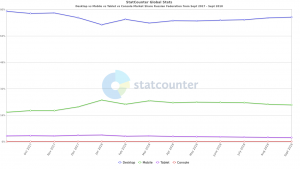
Welcome to the fourth in my series on alternatives to Google. It follows my piece No need for Google[1] back in May and my in-depth reports on Ecosia[2], DuckDuckGo[3] and Baidu[4].
Today we turn to Yandex. Since we last covered Russia’s search giant (way back in 2015) the engine has reasserted its dominance over Google in the market. It has a presence in other countries too and is branching out into numerous other tech verticals.
So let’s take a look at search in Russia and what Yandex is doing well in order to solidify its position. And what does the future hold for the brand and Russian search market at large?
A top-level view of digital Russia
Russia is the biggest internet market in Europe. It boasts more than 109m web users reaching 76% of the total population (according to Internet World Stats[5]).
The size of the market may not be much of a surprise, but the country’s digital landscape does have some unique traits. Desktops, for instance, are still the leading devices by which Russian users engage with the digital world. According to StatCounter[6], more than 75% of the platform market is accounted for by desktop use – with mobile and tablet weighing in at 22% and 2% respectively.
This proportion of mobile/tablet users compared to desktop users is far smaller than other big European internet markets such as the UK (where handheld devices now equal desktops), as well as the continent as a whole (where mobiles account for around 45% of digital platform use).


